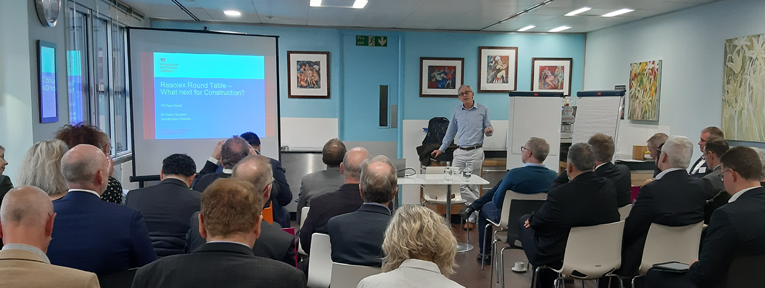A short summary of the presentation by David Hancock, Chairman of the Government Construction Board for the Cabinet Office and the Infrastructure and Projects Authority and is also chair of the NEC UK Users’ Group. volume
David’s presentation led to a lengthy discussion and debate from many differing perspectives, considering challenges around risk allocation, industry-level collaboration and the impact of digital technologies on the future of construction and infrastructure delivery in the UK.
David opened the session by commenting that construction in the United Kingdom is currently at the centre of a perfect storm, which will drive change in at least some parts of the industry. Customer dissatisfaction, low (or no) contractors’ profit margins, and a shortage of skilled labour are all creating pressure to find alternative business models. Adding in the rapid digitalisation of many other aspects of the world economy offers a significant opportunity to those firms who are prepared to invest in different ways of working; a huge threat to those that are not.
As chairman of the Infrastructure and Projects Authority (IPA), David has an overview of a huge pipeline of expenditure. The Government is planning to put £600 billion into the country’s infrastructure over the next 10 years. As the biggest client in the country, they have the potential to be a huge influence on the industry. Recognising the importance of their role, the IPA have an ambitious vision to use digital information technology to improve how the public estate is designed, constructed, operated and integrated into the country’s built environment.
The Government is therefore involved in a range of initiatives, one of which is a presumption in favour of offsite construction. Five of the largest government departments have committed to a platform design strategy based around increased standardisation, with the intention that more building components are manufactured in a controlled environment. David acknowledges that offsite manufacturing for construction is complicated and will take time to develop. The future potential benefits, however, are immense, not only producing a better product but also offering the opportunity of significant savings in cost and time.
Construction Innovation Hub
The Construction Innovation Hub brings together world-class expertise from the Manufacturing Technology Centre (MTC}, Building Research Establishment (BRE) and the Centre for Digital Built Britain (CDBB) to transform the UK construction industry.The future potential benefits, however, are immense, not only producing a better product but also offering the opportunity of significant savings in cost and time. Government has chosen three partners to form the Construction Innovation Hub. Aligned with the themes of the IPA publication, Transforming Infrastructure Performance, this Hub is intended to be the centre of excellence, driving challenge and change into all aspects of infrastructure delivery to provide innovation and improved performance and productivity. There is a clear focus on improving the use of digital and advanced manufacturing technologies to provide the benefits required.
“Although there have been developments in BIM and increased uptake of digital technologies, in
construction we still use digital in an analogue way.”
One of the primary barriers the industry must overcome is the low levels of collaboration and connectivity. David provided a graphic illustration showing how weak the networking effect is within construction when compared to industries such as software engineering, manufacturing, financial services and media. The outcome of such low connectivity is the very slow spread of new ideas and limited innovation.
The IPA is also supporting initiatives such as Project 13, where value is based on overall outcome rather than simply looking at cost and programme. They recognise the challenge is to build more collaboration through the industry so that everyone can help make the ‘pie’ bigger rather than simply focusing on their own self-interest. The government has chosen three partners to form a Construction Innovation Hub. These are:
- Manufacturing Technology Centre The Manufacturing Technology Centre (MTC) develops and proves innovative manufacturing processes and technologies in an agile, low-risk environment, in partnership with industry, academia and other institutions.
- Building Research Establishment We are an innovative group of researchers, scientists, engineers and technicians who share a common goal – to make the built environment better for all. We generate new knowledge through independent research.
- Centre for Digital Britain The Centre for Digital Built Britain is a partnership between the Department of Business, Energy & Industrial Strategy and the University of Cambridge to deliver a smart digital economy for infrastructure and construction for the future and transform the UK construction industry’s approach to the way we plan, build, maintain and use our social and economic infrastructure.
The Construction Innovation Hub will support the four key themes around which the IPA is shaping its plans, explained in detail in their publication, Transforming Infrastructure performance.
David closed the session by asking the audience how these plans might have an impact on the day-to-day practices of our own work. For change to take place within the industry each of us should examine how digital transformation could have a positive impact in the way we choose to operate.
His underlying point is that the Government can act as a catalyst for change but finding answers to the challenges posed will require the engagement of individuals and organisations who are prepared to invest time in working through the complexity of the challenge to build for the future.
